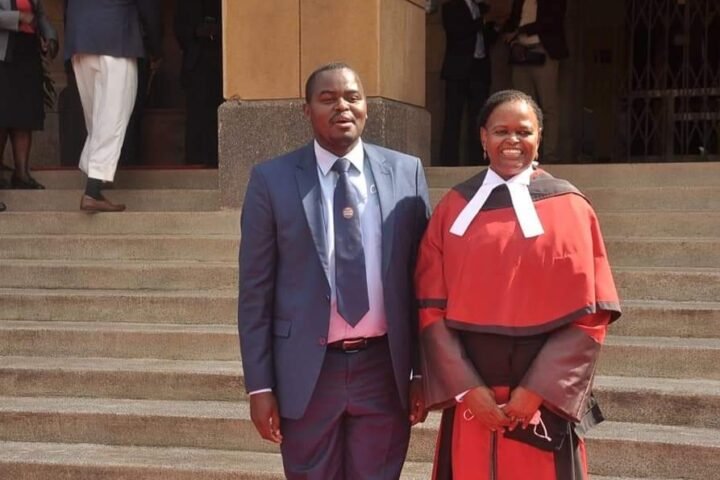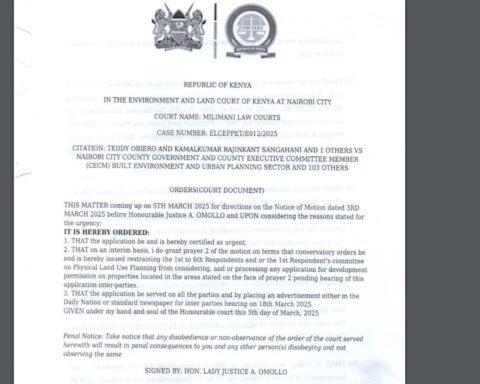The National Hospital Insurance Fund (NHIF) scandal has taken a significant turn with the involvement of Aden Duale’s associate, Abdul Galgalo Munishram. This high-profile case involves allegations of misappropriation of nearly Sh2 billion, sparking widespread concern and highlighting the pervasive issue of corruption within Kenya’s public institutions. On November 28, NHIF CEO Geoffrey Gitau Mwangi and acting Finance Director Wilbert Kiplangat Kurgat were released on a Sh1 million bond each by Anti-Corruption Court Chief Magistrate Francis Andayi. Their arrest on charges related to conspiracy to defeat justice and disobedience of a lawful order has further intensified the scandal.
The NHIF Scandal
The NHIF scandal first came to light with allegations of massive financial mismanagement and corruption. This scandal, involving key figures in the NHIF, has drawn significant public attention due to the substantial amounts of money and the critical nature of the healthcare services affected.
Aden Duale’s Associate: Abdul Galgalo Munishram

Abdul Galgalo Munishram, a name that has recently emerged in the scandal, is closely associated with Aden Duale. Munishram leads Messer’s Munshiram International Business System, a company specializing in software development and consultancy. His firm was engaged by NHIF to spearhead a long-term project to implement an extensive biometric system.
NHIF’s Biometric System Project
The biometric system project was an ambitious initiative aimed at centralizing civil servants’ records in a database and equipping 1,370 hospitals with biometric kits. The objective was to enhance healthcare accessibility by enabling Kenyans to verify their identity through biometric authentication, akin to methods used during the 2017 general election.
The Arrests and Legal Proceedings
The arrests of NHIF CEO Geoffrey Gitau Mwangi and acting Finance Director Wilbert Kiplangat Kurgat marked a critical development in the scandal. They were charged with conspiracy to defeat justice and disobedience of a lawful order. This move by the Anti-Corruption Court highlighted the seriousness of the allegations and the ongoing efforts to bring accountability.
Role of Abdul Galgalo Munishram in the Scandal
Abdul Galgalo Munishram’s role in the scandal has been a focal point of investigation. His company was responsible for the biometric system project, and it is alleged that Munishram demanded significant kickbacks, totaling Sh400 million. He allegedly conditioned his cooperation on NHIF making advance payments for the biometric imports, which raised red flags about the integrity of the project.
Implementation and Challenges of the Biometric System
Despite the initial promise of the biometric system project, its implementation faced numerous challenges. Although NHIF made full payments for the biometric equipment and initiated its nationwide installation, only four hospitals received the promised upgrades. This discrepancy raised serious questions about the management and oversight of the project.
Read: Aden Duale’s Associate Abdul Galgalo Munishram, Implicated In NHIF Multi-Billion Scandal
Corruption Allegations
The corruption allegations against Munishram and other influential figures involved in the project have severely tainted the initiative. It is alleged that these figures demanded kickbacks and manipulated the project for personal gain. These actions not only delayed the project but also undermined the trust in NHIF’s ability to manage public funds effectively.
Munishram’s Disappearance
Following repeated attempts by NHIF leadership to ensure the project’s completion, Abdul Galgalo Munishram disappeared. This unexpected turn of events left the project in limbo and further complicated efforts to hold those responsible accountable. NHIF’s response has been to pursue legal and investigative measures to locate Munishram and recover the misappropriated funds.
Critics’ Perspective
Critics argue that the charges against Geoffrey Mwangi and Wilbert Kiplangat Kurgat may be unjust. They suggest that the focus on these officials diverts attention from the main perpetrators of corruption, who are reportedly influential figures based in Karen. This perspective highlights the complex dynamics of accountability in high-profile corruption cases.
Comparison to Previous Scandals
The NHIF scandal has drawn comparisons to the National Youth Service (NYS) scandal, another high-profile case of corruption in Kenya. Both scandals involve large sums of money and influential figures, demonstrating a troubling pattern of corruption within public institutions.
Impact on the Kenyan Healthcare System
The NHIF scandal has had profound consequences on the healthcare system. The mismanagement and corruption have disrupted the delivery of essential healthcare services, affecting thousands of Kenyans who rely on NHIF for medical support. The public’s trust in the healthcare system has been significantly eroded, prompting calls for comprehensive reforms.
Legal and Ethical Implications
The broader legal implications of the NHIF scandal are significant. It underscores the need for robust anti-corruption measures and transparent governance within public institutions. Ethically, the scandal raises serious concerns about the misuse of public funds intended for critical healthcare services.
Current Status of the Case
As of now, the legal proceedings continue, with the implicated individuals facing various charges. Efforts to locate Abdul Galgalo Munishram and recover the funds are ongoing. The case remains a crucial test of Kenya’s judicial and anti-corruption systems.
The NHIF multi-billion scandal, involving Aden Duale’s associate Abdul Galgalo Munishram, is a stark reminder of the pervasive corruption challenges facing Kenya. The legal and ethical implications of this case are profound, highlighting the urgent need for accountability and transparency in public institutions. The impact on the healthcare system underscores the importance of safeguarding public funds to ensure they serve their intended purpose.













